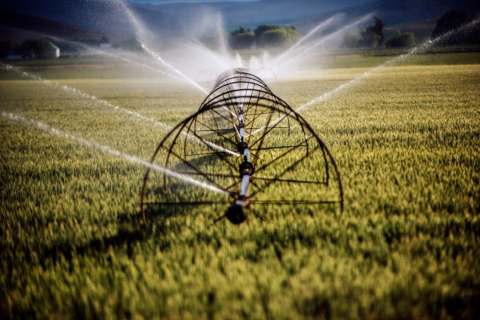The Farm Bill contains many programs that contribute to the maintenance and modernization of rural infrastructure, mainly in Title VI: Rural Development. This section of the bill covers a wide range of programs, including housing, workforce development, water infrastructure, broadband and telecommunications, business development, energy and utilities. You can see all of the programs here. Also, read more about some other important titles of the bill for cities, towns and villages: Conservation and Nutrition. For Rural Development, NLC has identified three topic areas as priority for the next version of the Farm Bill: broadband, water infrastructure, and energy and business.
Broadband
Fast and reliable internet is important for improving economic opportunity, education, health and public safety in communities. The Farm Bill facilitates the expansion of broadband services and infrastructure to households that are disconnected or lack sufficient access to reliable internet. Communities are not required to pursue grants directly – in some cases, a local electric or telephone cooperative may be a strong partner for communities to provide broadband service to an existing customer base with the assistance of federal grants or loans. The bill sustains two programs with successful track records in providing funding opportunities for local connectivity.
- ReConnect Loan and Grant Program – Connects eligible communities by ensuring these areas have fast and reliable broadband service. Between 2019 and 2022, the program has invested grants and loans amounting to $3.14 billion in projects across the country. A combination of loans and grants can be used for various types of broadband infrastructure, including fiber-optic cable, fixed wireless service, and other technologies capable of providing high-speed internet access. Learn more about eligibility and requirements here.
- Community Connect Grants – This funding supports bridging the digital divide. Rural areas that lack any existing broadband speed of at least 25 megabits per second (Mbps) downstream and 3 Mbps upstream are eligible to apply. The funds are critical for connecting not only households, but critical community facilities such as schools, fire stations and libraries.
Water Infrastructure
Approximately 95 percent of water infrastructure spending occurs at the community level, and 87 percent of people nationwide are served by public water utilities. The policies, strategies and priorities established by local leaders have the power to fundamentally shift how people think about and use water. The U.S. Department of Agriculture’s Rural Utilities Service Water and Environmental Programs help rural communities obtain the technical assistance and financing necessary to develop drinking water and waste disposal systems. The program is exclusively focused on the water and waste infrastructure needs of rural communities with populations of 10,000 or less.
- The Water and Waste Disposal Grant provides funding for drinking water systems, sanitary sewage disposal, sanitary solid waste disposal and stormwater drainage in eligible rural areas. This program is designed to support applicants who are not able to obtain commercial credit on reasonable terms. The application window varies by state.
Energy and Business
Not only does expanding rural energy infrastructure provide an essential service and lower energy costs, but by diversifying and expanding energy infrastructure in rural areas, energy independence and resiliency can increase for the whole country. Stimulating business opportunities and economic growth can lead to increased income and an improved quality of life, reducing rural-urban disparities.
- Rural Energy Pilot Program – Provides direct grants to municipalities to develop community-scale renewable energy projects, energy efficiency programs and community energy planning.
- Rural Energy for America Program – Provides loans and grants to small businesses and agricultural producers to install renewable energy systems or make energy efficiency improvements. Municipal electric utilities serving rural customers may qualify as a small business under this program.
- Rural Innovation Stronger Economy Grants – Offers grants to municipalities and other entities to support and create workforce training programs or business incubator facilities.
- Community Facilities Direct Loan and Grant Program – Develops municipal community facilities to more effectively support the public. Community facilities range from health care centers to city hall buildings, fire departments, community gardens and food pantries. The public library in Bassett, NE used their Community Facilities grant to expand and renovate their building, adding a community meeting room and accessible restrooms.
Timeline and Call to Action
With the expiration of the Farm Bill approaching at the end of September 2023, and now that Congress has passed a debt ceiling bill, it is possible that congressional committees will release Farm Bill legislative text before the end of summer. Some of the provisions of the Farm Bill have been in the spotlight, as they’ve become sticking points in debt ceiling negotiations, particularly around the expansion of work requirements for the Supplemental Nutrition Assistance Program. In addition, the debt ceiling bill spending caps could impact agricultural programs that rely on the annual appropriations process for funding. process for funding.
Congress continues to hold hearings in both the House and Senate Agriculture Committees. As Congress works on drafting language, now is an important opportunity for local leaders to advocate for the programs and policies that impact their communities. If Congress does not pass a bill reauthorizing the programs in the Farm Bill by September 30, 2023, they must pass a short-term extension. Failure to reauthorize the Farm Bill in a bipartisan manner and timely fashion will have significant impacts on local communities and economies in both urban and rural areas.
NLC has shared a list of Farm Bill reauthorization priorities with the Senate and House Agriculture Committees. Local leaders can reference this letter to uplift these important local programs and policies. Reference the links below to see if your member of Congress is on an Agriculture Committee.












